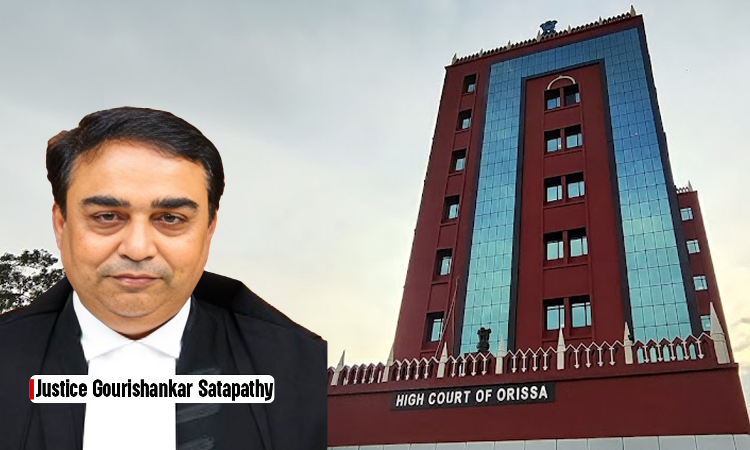- Home
- /
- High Courts
- /
- Orissa High Court
- /
- Able-Bodied Husband Having Govt...
Able-Bodied Husband Having Govt Service Statutorily Required To Maintain Wife & Children: Orissa High Court
Jyoti Prakash Dutta
13 March 2025 11:25 AM IST
The Orissa High Court has remarked that an able-bodied husband having government service is statutorily required to maintain his wife and children notwithstanding any marital or other dissention between them.While deciding the challenge to a maintenance order, the Single Bench of Justice Gourishankar Satapathy observed –“…fact remains that once a relationship of marriage is found to...
The Orissa High Court has remarked that an able-bodied husband having government service is statutorily required to maintain his wife and children notwithstanding any marital or other dissention between them.
While deciding the challenge to a maintenance order, the Single Bench of Justice Gourishankar Satapathy observed –
“…fact remains that once a relationship of marriage is found to be admitted and not dissolved by any competent Court of law, the husband being an abled body person and working in a Government employment is statutorily required to maintain his wife and children, even there is a dissention between the parties.”
Case Background
This revision petition was filed by the petitioner-husband challenging the impugned order passed by the Judge, Family Court, Khurda whereby he was directed to pay a sum of Rs.5,000/- per month to opposite party-wife and Rs.3,000/- per month to opposite party-son towards their maintenance effective from the date of filing of the application under Section 125, CrPC.
It was submitted on behalf of the petitioner-husband that though he is willing to take back the wife to the matrimonial home, she is reluctant to join his company and in fact, there is no allegation of cruelty against him. It was argued that the trial Court, without taking note of the fact that the wife has refused to stay with him without any sufficient cause, has passed the impugned order.
On the contrary, it was submitted on behalf of the opposite party-wife that though the application for divorce filed by the husband was not allowed by the trial Court and the same was confirmed by the High Court as well as the Apex Court, he still preferred this revision only to harass her and thus, the revision petition is liable to be dismissed.
Court's Observations
The Court took note of the fact that the petitioner-husband had earlier filed a petition for divorce, which was rejected by the Family Court and was confirmed not only by the High Court but also by the Supreme Court. Therefore, it held that the parties are spouses having marital dissentions.
Justice Satapathy, however, placed reliance on the recent judgment of the Supreme Court in Rina Kumari v. Dinesh Kumar Mahto & Anr., 2025 LiveLaw (SC) 47 wherein it was held that mere passing of a decree for restitution of conjugal rights at the husband's behest and non-compliance therewith by the wife would not, by itself, be sufficient to attract the disqualification to get maintenance under Section 125(4), CrPC.
“It is, therefore, very clear that when the wife has reason to stay separately, she can maintain an application for maintenance, even though a decree of restitution of conjugal right has been passed by a competent Court, but in this case, admittedly there is no proceeding between the parties for restitution of conjugal right and on the other hand, the learned trial Court after referring to the evidence on record has rightly considered that since the wife is unable to maintain herself, she is entitled to maintenance,” he observed.
The Bench further held that despite of such matrimonial dissention, the petitioner-husband is liable to provide maintenance to his wife and child, especially taking into account the fact that he is a government employee and his marriage with the opposite party-wife still subsists.
So far as giving maintenance to child is concerned, the Court further relied on the landmark ruling of the Apex Court in Rajnesh v. Neha (2020) wherein it was categorically held that education expenses of the children must be normally borne by the father, apart from other living expenses.
Resultantly, the Court did not find any error in the order of the Family Court which granted the aforesaid maintenance amounts to the wife and child. It also rejected the contention of the petitioner that maintenance can only be granted prospectively. To clarify the prevalent position of law, the Court again referred to Rajnesh (supra) which held as follows –
“Even though a judicial discretion is conferred upon the Court to grant maintenance either from the date of application or from the date of the order in S.125(2) CrPC, it would be appropriate to grant maintenance from the date of application in all cases, including Section 125 CrPC…It would therefore be in the interests of justice and fair play that maintenance is awarded from the date of the application.”
Accordingly, the revision petition was dismissed and the impugned order was upheld with a direction to the petitioner-husband to pay maintenance from the date of filing of the application.
Case Title: Tarun Kumar Gadabad v. Subhalaxmi Lenka & Anr.
Case No: RPFAM No. 85 of 2014
Date of Judgment: March 05, 2025
Counsel for the Petitioner: Ms. Sumitra Mohanty, Advocate
Counsel for the Opposite Party: Mr. Sukumar Ghosh, Advocate
Citation: 2025 LiveLaw (Ori) 41



